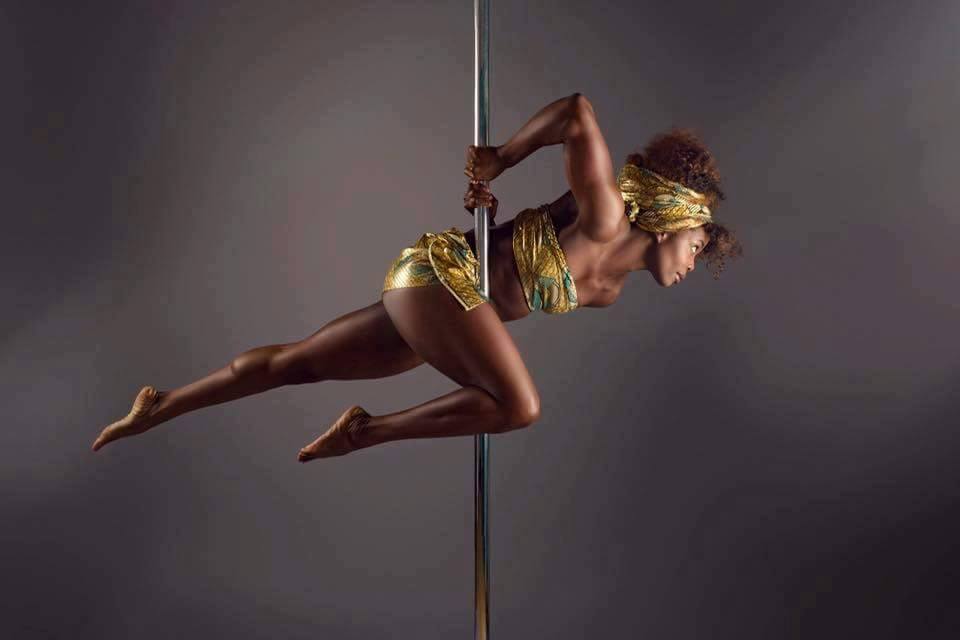
Kelechi Okafor (@Kelecnekoff) better described as the one and only ‘Benz Punani Womanist’ is an acting, twerking and pole fitness instructor that is taking the fitness scene and the world by storm. I first met Kelechi at a talk run by Tribe – a London based organisation that creates and provides leadership programmes to empower young women of colour on black women, wellbeing and self-care. Kelechi was one of the panellists who spoke openly about her experiences as a black women, to the point where I teared up in admiration of her bravery and resonated with her experiences.
Growing up Kelechi always had a fond interest in sports, we spoke about the fact that she would often participate in 200 meter sprints and relays in school, and not only was she incredibly athletic but she was also a very talented actress. In school she was almost always cast as the lead role in productions and at parents evening her teacher suggested that Kelechi should get serious about acting and pursue it further. Though this was incredibly complementing, growing up the expectation of Kelechi was to become a doctor or lawyer and her mother took offence at those suggestions.
Despite the seeming disapproval from her mother, after leaving school Kelechi pursued her interest in acting creating and directing a few pieces here and there. During a dry-spell with the acting Kelechi took up part-time work in call centres, she told me“when doing these part-time filler jobs I was so unhappy, the most unhappy I’d ever been” so she left to re-ignite her interest in sport and fitness and qualify as a personal trainer.
Simply by taking this step, without necessarily realising it, Kelechi was taking up space in a political way. We spoke about her perceptions of fitness when she joined the industry and she joked that, “growing up the only thing [she] used to see surrounding fitness was white girls laughing at their salad and I used to think what was so funny about the salad”. She makes a valid point as many fitness regimes and crazes have been co-opted by white women, we see this mainly in the appropriation of practices like yoga that have been deemed discriminatory against people of colour even though it is something that has been deeply rooted in certain communities of colour for centuries. At that moment in time, she was so much happier, when speaking to her she told me “it was the best decision I ever could’ve made, I felt like I was living all the time and I was completely fulfilled by assisting people in achieving their goals”. The journey was not easy and understandably being a black women in a white space came with it’s trials and tribulations.
As Kelechi was teaching at a studio space she rented out in London, her classes started to become very popular and like the savvy business person she is, she saw this as an opportunity to expand her Twerk and Pole classes to a studio in Manchester called Bodybarre. After approaching them very kindly to offer her services she was met by a very abrupt and vicious rejection where the white studio owner claimed that her classes were ‘too basic’. After a thread on Kelechi’s twitter the incident went viral and a multitude of news articles were written in defence of her as the studio that credits Miley Cyrus for inventing the ‘fitness craze’ twerking was evidently in the wrong. When speaking about this incident she said that “the defensive and aggressive behaviour from the studio was due to the fact that often when people are called to task about the things they help themselves to and appropriate they can’t handle it”. She was right, we’ve seen this most recently with the Marc Jacobs scandal where he was called out for using multi-coloured dreads on his predominantly white models and he clapped back viciously at those who critiqued him asking why they didn’t speak up when “black women straighten their hair”. On the issue of appropriation Kelechi said “we’re all tired of being stolen from and denigrated in the process. You tell us and treat us as if we’re worthless yet find worth in everything we create so by default we’re not worthless”. It is often black women that are stolen from and have to bare the brunt of these incidents alone. The studio Kelechi was at during this incident did very little to help or console her and she had to fight this battle alone.
As a black woman, I too have experienced the way that we are often left high and dry and in need of having these conversations about identity and ownership. Words like ‘bitter’ and ‘angry’ are thrown around as a means to distract us from the discourse. Kelechi described these feelings as ones you’d experience if you “spent 10 years building a house by hand, just for someone else to come and put their name at the front of it and start living inside it. A house you built for yourself! Why is it that as black women we are always forced to be quiet about our exploitation? When we have every right to feel the way that we feel.”
Twerk, a dance term initially used by DJ Jubilee, a pioneer of New Orleans Bounce music, has strong links to Kelechi’s West African heritage. For Kelechi, twerking is an act of reclaiming something that is incredibly “hypersexualised” by western standards and seen as a “low art” in comparison to ballet that is seen as a “high art”. Often the scathing comments made about twerking are always about the perceived lack of clothing worn by dancers, but Kelechi argues that in “ballet they wear skin-tone leotards as means of creating the illusion of nudity so what’s the difference?”
Tired of seeing black women sidelined and “white people white peopling” Kelechi mustered up the confidence to start a GoFundMe account and raised enough money to start her own studio in east London which she opened 5 September 2016. On opening her own space she said that ”for us to have a voice we need an economic advantage but it is easier said than done, it’s so easy to say to black women go and start a business but how are we supporting them when they do just that”. Kelechi is really a game changer and feels now she has this studio she can “start helping to change the narrative that fitness is whitewashed” and she is no longer being seen as a subordinate, but as an equal. By opening this studio Kelechi has created a space where not only black women but all women can express themselves and get fit in the process.
Kelechi will be hosting a Twerkshop at the gal-dem V&A Friday Late.









